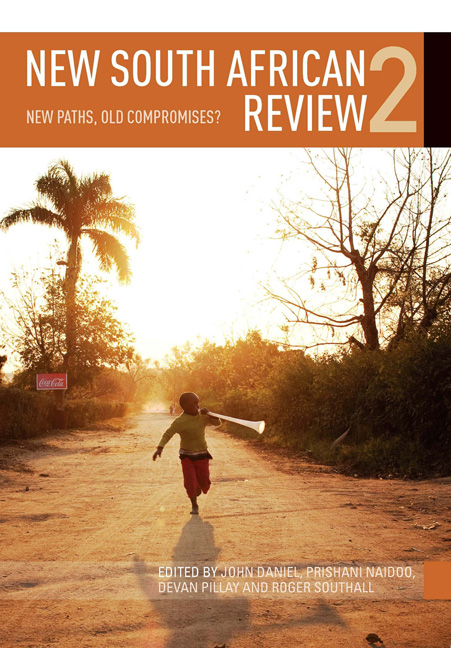Book contents
- Frontmatter
- Contents
- Preface
- Introduction: New paths, old (com)promises?
- PART 1 POLITICS AND INTERNATIONAL
- PART 2 ECONOMY AND SOCIETY
- Introduction: Continuing crises, contradictions and contestation
- Chapter 8 ‘The wages are low but they are better than nothing’: The dilemma of decent work and job creation in South Africa
- Chapter 9 The crisis of childcare in South African public hospitals
- Chapter 10 The worker cooperative alternative in South Africa
- Chapter 11 Policing in the streets of South African townships
- Chapter 12 BEE Reform: The case for an institutional perspective
- Chapter 13 Bokfontein amazes the nations: Community Work Programme (CWP) heals a traumatised community
- PART 3 ENVIRONMENT
- PART 4 MEDIA
- Contributors
- Index
Chapter 11 - Policing in the streets of South African townships
from PART 2 - ECONOMY AND SOCIETY
Published online by Cambridge University Press: 23 March 2018
- Frontmatter
- Contents
- Preface
- Introduction: New paths, old (com)promises?
- PART 1 POLITICS AND INTERNATIONAL
- PART 2 ECONOMY AND SOCIETY
- Introduction: Continuing crises, contradictions and contestation
- Chapter 8 ‘The wages are low but they are better than nothing’: The dilemma of decent work and job creation in South Africa
- Chapter 9 The crisis of childcare in South African public hospitals
- Chapter 10 The worker cooperative alternative in South Africa
- Chapter 11 Policing in the streets of South African townships
- Chapter 12 BEE Reform: The case for an institutional perspective
- Chapter 13 Bokfontein amazes the nations: Community Work Programme (CWP) heals a traumatised community
- PART 3 ENVIRONMENT
- PART 4 MEDIA
- Contributors
- Index
Summary
INTRODUCTION
Police reform forms part of the debate in transitional societies that are moving from colonialism, communism, conflict and various forms of authoritarianism, to democracy. Bruce (2009) argues that post-conflict African countries are characterised by uneven state and non-state partnerships in policing, concluding that police and community partnerships should be strengthened and should focus on crime prevention rather than on police using communities as tools for state policing. In the same breath, Albrecht and Buur (2009) recognise the tensions in state-civilian policing partnerships in security and development reform programmes in sub-Saharan Africa. They partly attribute the tension to lack of an understanding of the context by policy makers and bureaucrats. Ivkovic (2009) outlines police transition in Croatia and concludes that recent research shows improved but uneven and uneasy reform from police servicing communist governments to servicing civilians. Kešetovic (2009) addresses the requirement for Serbian police to exert control in the context of multicultural minorities. Even though the context and priorities are different in transitional societies, the commonality is that police reform research (as in South Africa, cf. Rauch, 2000) typically focuses on crime reduction and prevention (Cf. Marks and Shaw, 2002), police accountability (Cf. Leggett, 2002), community policing, the law of policing (Cf. Brogden, 1994), and public relations with the police.
It is the relationship between police and public (in the context of transformation) that form the subject of this chapter, which tries to bring forth the daily experiences of police and community as they encounter each other at street level. The encounters are analysed in the context of transforming the South African Police Service from its previous apartheid and militaristic orientation into community policing in which the objective of policing is not only to fight and prevent crime but also to make communities feel safe.
The chapter argues that transforming the relationship between the police and communities in South African townships should not be reduced to the formal application of democratic law. Rather, we must also understand the tensions and informalities in everyday policing (Hornberger, 2004) and both the hidden and public transcripts that are embedded in the social history and practice of policing in South Africa and which have implications for democratic policing and the post-1994 generation of police. Moreover, they add to Marks's and Wood's (2010) argument for minimalist policing.
- Type
- Chapter
- Information
- New South African Review 2New paths, old compromises?, pp. 221 - 235Publisher: Wits University PressPrint publication year: 2012



